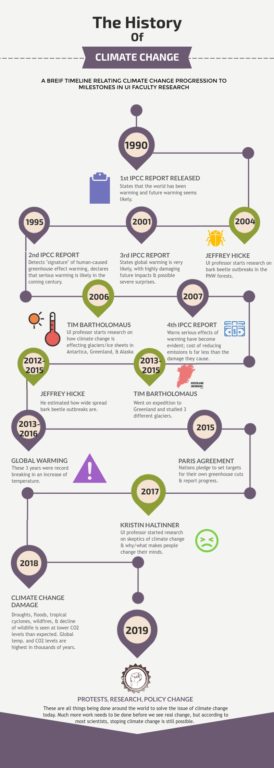University of Idaho faculty members have created a team of climate change researchers with diverse expertise to study these issues and provoke discussion on the UI campus.
Professors and students in the sciences are striving to understand the impacts climate change has on our environment.
Kristin Haltinner, a sociology professor, researches why people are skeptics on climate change, people who’ve changed their minds and what behaviors lead them to change their minds.
She said she has found fear can be paralyzing for many people and prevent them from taking action. She also found that most people change their minds in college, when they are receiving higher education and surrounded by many different people, opinions and backgrounds.
Jeff Hicke, a geology professor who focuses on the effects of bark beetle outbreaks is the Pacific Northwest forests, is one of the many faculty members doing research on climate change.
His research suggests the beetle outbreaks are caused by a rise in global temperatures, which creates a continuous cycle of global warming. As the temperatures rise, the beetles kill more trees, and as the beetles kill more trees the temperature rises even more.
ICYMI: Two former members of congress talk climate change on University of Idaho campus
Timothy Bartholomaus, a geology professor and glaciologist, researches what controls fast glacier and ice sheet change. He’s been on over 20 expeditions to Alaska, Greenland and Antarctica to collect data of glaciers and ice sheets rapidly moving and melting.
In these expeditions he said he found the driving force of glacier change is the increasing temperature of the water from climate change, seasons and the shape of the trough.
These researchers acknowledge climate change is an issue and are working to understand how it affects people. By understanding climate change, they know how to better prepare and believe it’s still possible to fix.
Bartholomaus said he knows the world is looking at climate disruption already, but believes there’s so much room for us and our governments to make choices about the future we want.
“Below the federal government level and even in the House of Representatives and the Senate there is acceptance of climate change, there is action. I think that is sort of pushing the federal government,” Hicke said.
Individual states are moving quickly to adopt new forms of energy. Many companies, institutions, and governments have signed on to “We Are Still In,” an organization indicating their commitment to the Paris Agreement despite the United States pulling out.
ICYMI: Why aren’t UI students politically active?
“I don’t think the problem is education, it’s agendas… I don’t think it’s congressmen not knowing, it’s that they don’t want to admit to know because it’s a problem for their contingencies or they’ll lose the funding provided by gas,” Hicke said.
Amongst all the controversy, they still find hope. Haltinner, Bartholomaus and Hicke said they believe there is still time to fix climate change. From synthesis reports, academic reviews and increased discussion, more Americans every year are believing and taking climate change seriously.
People like Great Thunberg, a 16-year-old climate activist, are what give Haltinner hope. She is in full support of the Friday protests for climate change, but said it will take a lot of Gretas until real change.
Climate change is now and largely a result of human activity. The only way to explain the observed changes in global climate, patterns, and weather is by accounting for the influence of carbon dioxide, Bartholomaus said.
“I don’t think it’s too late, I do think we have to start acting pretty darn quickly and we have to do a lot of figuring out and we have to do it with political will,” Hicke said.
As climate scientists, they all do their part in cutting their carbon footprint.
Bartholomaus has committed to eating less meat based on studies that show raising animals for meat is a major source of carbon pollution.
Hicke purchases credits to offset the carbon burned when he travels and recently made a donation to the UI Sustainability Center effort to install solar panels on the IRIC building.
Haltinner has solar panels installed in her own home and tracks the energy usage of her and her family.
All three researchers acknowledge the harmful effects traveling has on the environment, and try to reduce their impact no matter how difficult.
Haltinner travels via train with her family on trips to the other side of the country because it’s less harmful than flying.
Bartholomaus and Hicke said they ride their bikes or walk to work almost every day, winter or summer.
These researchers try their best to do their part in the fight for climate change. Small changes in your everyday life can make a big impact in an issue that may seem too inconceivable to tackle.
According to these researchers, it’s not too late if we start right now.
Elizabeth Holdridge can be reached at [email protected]
